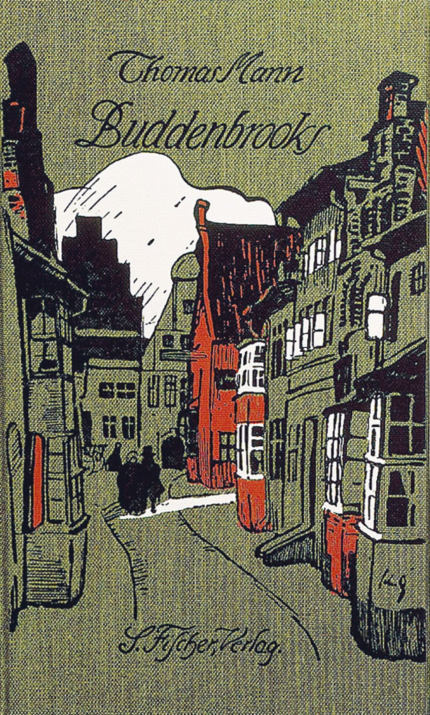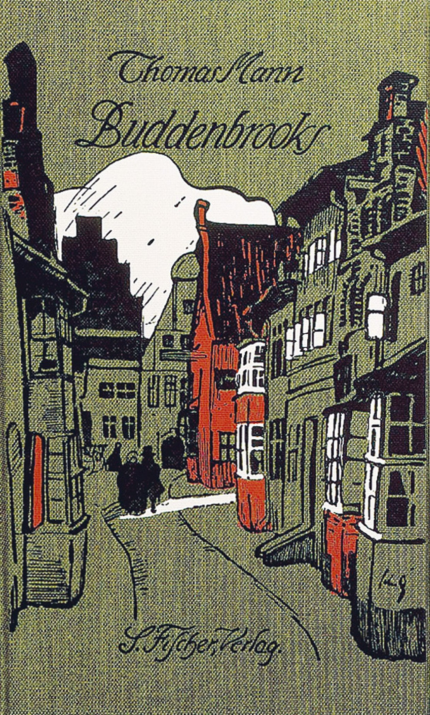Buddenbrooks, by Thomas Mann

Buddenbrooks by Thomas Mann
My rating: 5 of 5 stars
Except for some periods, I have always read a lot and very mixed across all genres. So it’s inevitable that there was pretty much everything from almost unbearable rubbish to average reading experiences. However, I rarely experienced something like literary “awakening moments”. Thomas Mann’s “Buddenbrooks” was one such moment.
Published in 1901 when Mann was only 26 years old, “Buddenbrooks” established his world fame and earned him the Nobel Prize for Literature in 1929, because the work “over the years has gained an increasingly firm recognition as a classic work of contemporary literature.”
At least for me, that has not changed, because although “Buddenbrooks” portrays the decline of a specific family in 19th century Lübeck, it has lost nothing of its fundamental topicality and truthfulness.
Mann tells the story of four generations of the Hanseatic merchant family Buddenbrook from 1835 to 1877 with great attention to detail and psychological sensitivity. As a silent witness, the reader dives deeply into the lives of the protagonists without ever seeming voyeuristic. Rather, one can hardly resist the Buddenbrooks – every generation and every individual family member convinces with complexity and character depth.
The characters are so vivid and multifaceted that they never let go of me. Whether the materialistic Johann, the gruff Thomas, or the perpetually sickly Klothilde – I understood each individual person in their complexity and at the same time, was irritated, delighted, and sometimes felt like I was sitting with them “on the stones”…
Mann describes both the private and business relationships within the family, providing insights into the social structures and norms of the 19th century.
The characterization of the characters already mentioned is a crucial element of the novel, and Mann succeeds excellently in bringing the different personalities, dreams, fears, and hopes of the family members to life. My personal favourite character is Thomas Buddenbrook; an intelligent and ambitious businessman who tries to maintain the family business while leading a fulfilling private life. His inner conflict, his fears, and his unconditional loyalty to the family impressed me deeply – and his personal decline and death (after a visit to the dentist – very relatable for me!) left me touched.
Another notable character is Tony Buddenbrook, the lively and determined daughter of the house. Her failed marriages and difficult relationship with her brother Thomas are central themes of the novel. The way Mann portrays her development from a young, carefree woman to a broken but still strong personality is impressive.
The language of the novel is as captivating as the plot; both artistic and understandable, full of allusions and nuances, in a very poetic way. However, the language is never convoluted or difficult to understand but always clear and precise. Mann’s style is rich in images and symbols that transport the reader into the world of the 19th century. He turns everyday occurrences into great literature. His precise descriptions of the places where the action takes place bring the Lübeck of that time to life. The dialogues are also authentic and vividly designed, so that as a reader, one feels directly transported into the conversations of the characters.
Rarely have I read a novel that so masterfully combines literary quality with broad impact.
Another highlight of the novel is the integration of historical events and political developments into the narrative. Mann demonstrates how the societal changes and economic challenges of the 19th century influence the fate of the Buddenbrook family and contribute to the decline of their once successful mercantile house. Topics such as the rise of the bourgeoisie, industrialization, and the influence of the church on society are explored. This variety of themes makes the novel an important historical document and shows how intertwined the lives of people and society are.
At the end of the novel, in the face of the family’s decline, which now only lives on in the memory of readers, a feeling of melancholy remains. This novel, in my opinion, will never let me go: I have read it multiple times, I have listened to the magnificent audiobook, read by the incomparable Gert Westphal, on long car journeys, and seen all the film adaptations (none were bad, none fully convinced me).
In Lübeck, my wife and I visited the locations of the plot, especially the Buddenbrook house on Mengstraße 4, and enjoyed the Niederegger marzipan mentioned in the novel.
“Buddenbrooks” is a monumental masterpiece of timeless relevance, and Thomas Mann is an author of formative significance, whose mastery I would like to rediscover at any time.
Five out of five stars.

Is it in English?
Yes, it has been translated into pretty much every language.
Biplab Das, it has been translated into pretty much every language. English being one of the first, yes.